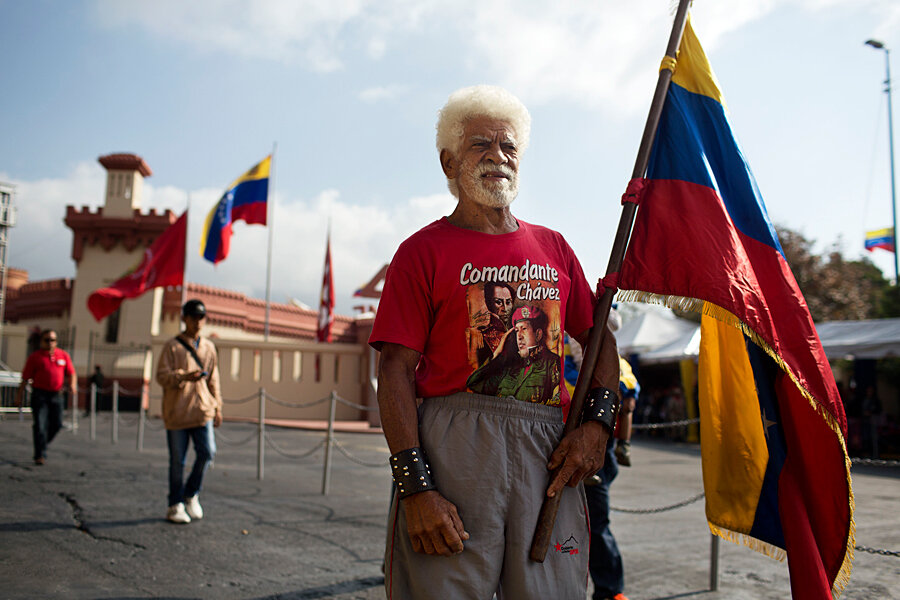Chávez anniversary: Military parade and opposition protests fight for attention
Loading...
| SAN CRISTÓBAL, Venezuela
When Nicolás Maduro announced the death of then-President Hugo Chávez on March 5, 2013, Venezuela’s streets flooded with red-clad supporters mourning their revolutionary leader’s death.
But that political landscape has changed. As Venezuela commemorates one year without its “Comandante” Chávez, who altered the course of history in this oil-rich nation, his successor’s capacity to sustain the Chavismo movement is facing its toughest challenge yet from opposition street protests.
In San Cristóbal, a bastion of anti-Chávez sentiment in western Venezuela, protesters intend to mark the date by staging an expanded march through the city, and defending their barricades of burning tires, old furniture, stoves, and garbage on the city’s sloping streets.
Manned by university students and residents of largely lower middle class neighborhoods, protesters late Tuesday stockpiled stones to prepare to confront police and the National Guard, who had vowed to clear the streets overnight.
Nationwide, the protesters say they are fed up with rampant crime and shortages of basic goods such as cooking oil, milk, and toilet paper. “This is not about politics, this is about how we are forced to live,” says Santiago Jaramillo as he stands at a barricaded intersection in San Cristóbal.
The economic and security problems that animate protesters already existed under former President Chávez. But after almost one year in office, President Maduro – who was elected in April 2013 by a razor-thin margin – has failed to confront the growing problems head on, analysts say.
“Chávez bequeathed Maduro a warped, dysfunctional system shored up by petro-dollars, Chinese loans, political showmanship, and institutional control,” says Rory Carroll, author of “Comandante: Hugo Chávez’s Venezuela”. “Maduro has been erratic and unable to tame the system's worsening distortions,” says Mr. Carroll.
The opposition senses a weakness in Maduro, says George Ciccariello-Maher, a professor of political science at Drexel University, which makes him easier to challenge. “Chávez had a way to hold things together that Maduro doesn’t,” Mr. Ciccariello-Maher says.
'Expectations'
Residents in San Cristóbal, a city of about 500,000 close to the border with Colombia, first took to the streets early last month. The demonstrations soon spread to Caracas and other cities, in the worst unrest in a decade in this country of 29 million. At least 18 people have been killed as protesters clash with security forces and Maduro supporters.
“This is the reflection of an accumulation of unmet expectations that come from 15 years of Chavismo,” says San Cristobal mayor Daniel Ceballos, an opposition politician.
Though the antigovernment protesters, made up mostly of the middle class and economic elites, has failed to rally poorer sectors of Venezuelan society – where Chávez had his strongest support – even some self-professed Chavistas may be wavering.
Seamstress Gladys Delgado still has sun-stained portraits of Chávez on the walls of her home in El Hatillo, a suburb of Caracas. But things aren’t the same since he died, she says.
"There are long lines for everything now. And there are so many shortages that sometimes there are riots in the supermarkets,” Ms. Delgado says.
“I am disappointed in Maduro. I don’t see that he’s capable of resolving the situation,” she says. But for Delgado, the opposition won't get her vote.
Despite widespread discontent, the protesters’ dissatisfaction with Maduro is unlikely to topple the president.
“The chance of the government coming down is close to zero,” says Ciccariello-Maher, author of “We Created Chávez: A People’s History of the Venezuelan Revolution.” He adds that demonstrations are far smaller than the protests that briefly unseated Chávez in a 2002 coup.
“The armed forces are solidly Chavista and there continues to be a solid base of Chavismo,” he says.
In Caracas today, a military parade will mark the anniversary of when Maduro announced to the nation that Chávez, who suffered from cancer, had died. A ceremony at the shantytown mausoleum where Chavez’s remains are buried is to follow.
But the event is bittersweet for Delagado, who emphasizes that Maduro is not Chávez. “He has no character, he is not the wise man that Chávez was.”
- Andrew Rosati contributed reporting from Caracas.







